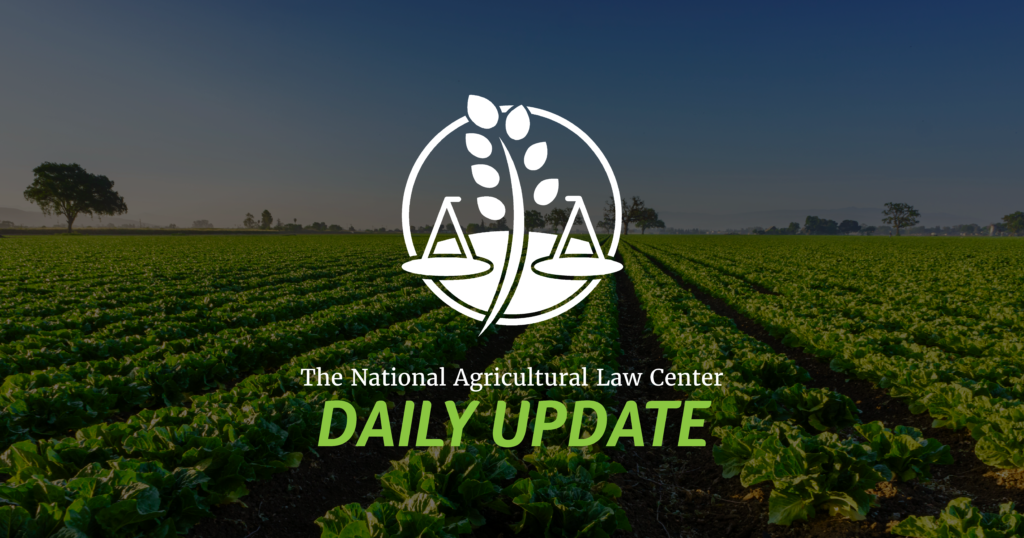A comprehensive summary of today’s judicial, legislative, and regulatory developments in agriculture and food. Email important additions HERE.
JUDICIAL: Food Labeling, Dormant Commerce Clause
In CHRISTOPHER LEMKE, individually & on behalf of all others similarly situated, Plaintiff, v. KRAFT HEINZ FOOD COMPANY, Defendant., No. 21-CV-278-WMC, 2022 WL 1442922 (W.D. Wis. May 6, 2022), plaintiff claimed that the defendant’s “Bagel Bites” were falsely represented. Plaintiff alleged that the product was deceitful because it did not contain real mozzarella chees and tomato sauce as they are understood and expected by consumers. The court found that the plaintiff did not plausibly allege that reasonable consumers would not receive the mozzarella cheese, real cheese, and tomato sauce that is on the products label. The court held that plaintiff failed to state a claim for relief and dismissed the case.
In Ass’n des Éleveurs de Canards et d’Oies du Quebec v. Bonta, No. 20-55882, 2022 WL 1436840 (9th Cir. May 6, 2022), the court considered whether California’s sales ban on products that are the result of force feeding a bird for the purpose of enlarging the bird’s liver beyond normal size was preempted by the Poultry Products Inspection Act (PPIA) or violated the dormant Commerce Clause. Additionally, the court considered whether out-of-state sellers can make sales via internet, phone, or fax. In 2004, California passed a law that prohibited force feeding a bird and banned the in-state sale of products that are a result of force-feeding birds. Various foie gras sellers sued to enjoin enforcement. The district court found that the law was constitutional and that there were no preemption issues. The district court also held that the ban did not prohibit out of state vendors sales to California buyers. Both parties appealed the decisions.
Sellers’ claimed that it is impossible to produce foie gras without force feeding and therefore the law is impossible to comply with and also poses an ingredient requirement in addition to or different than federal law. The court found that the law is possible to comply with as there is not a federal law that is banning force-fed products and that the sales ban on force-fed products only prevents sales in California and not the entire market. The court also held that force feeding was not an ingredient requirement preempted by the PPIA because it concerns how an animal was raised and not the physical components of poultry products.
Sellers’ also claimed that the sales ban was unconstitutional because it impermissibly regulated out-of-state commerce and conduct and unduly burdened interstate commerce. The court found that California’s sales ban prohibits only in-state sales of foie gras so it was not impermissibly regulating out-of-state conduct even if it influenced out-of-state producers’ conduct. The court also found that the sales ban was not discriminatory so the statute did not impose an undue burden on interstate commerce.
The California Attorney General argued that the sales ban prohibited out-of-state vendors’ sales to California buyers, even when order and payment is processed outside the state and the only in-state conduct is third-party delivery to (or transportation by) the consumer. The court agreed with the district courts reasoning and found that the legislative history and the UCC’s definition of “sales” meant that out of state sales to California vendors were allowed under the law.
The Ninth Circuit Court of Appeals affirmed the findings of the district court and held that the sales ban was not preempted or unconstitutional. The court also held that internet, phone, and fax sales by out-of-state sellers was permitted by California law.
REGULATORY: FDA, FWS, NOAA
FOOD and drug administration
Final rule amending the color additive regulations to provide for the safe use of Antarctic krill meal, composed of the ground and dried tissue of Euphausia superba, with or without the lipid fraction, for use in the feed of salmonid fish, to enhance the color of their flesh. Info here.
Notice announcing the availability of a draft guidance for industry #272 entitled “Practices to Prevent Unsafe Contamination of Animal Feed from Drug Carryover.” Info here.
FISH AND WILDLIFE SERVICE
Notice announcing FWS is initiating 5-year status reviews for 167 species in Oregon, Washington, Idaho, Montana, California, Hawaii, Guam, and the Northern Mariana Islands under the Endangered Species Act of 1973. Info here.
NATIONAL OCEANIC AND ATMOSPHERIC ADMINISTRATION
Notice announcing that NOAA/NMFS has received a request from the U.S. Army Corps of Engineers, Jacksonville District, for authorization to take, by Level B harassment only, small numbers of marine mammals incidental to the Port Everglades Harbor Deepening and Widening Project, in Broward County, Florida, for a period of five years from August 2024 through August 2029. Info here.
